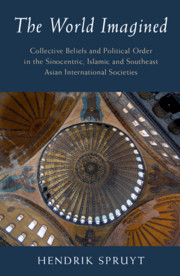 The World Imagined
The World Imagined from Part I - Beyond the Westphalian Gaze
Published online by Cambridge University Press: 18 June 2020
This chapter exposes the weaknesses and empirical fallacies of positivist and ahistorical accounts of international order. It shows that sociological and historical scholarship provides a more satisfactory approach to understanding political order and interstate relations. Interpretivist historical reflection on non-European systems consequently sheds light on the interactions between European and other international systems that did not consist of sovereign, territorial polities.
To save this book to your Kindle, first ensure [email protected] is added to your Approved Personal Document E-mail List under your Personal Document Settings on the Manage Your Content and Devices page of your Amazon account. Then enter the ‘name’ part of your Kindle email address below. Find out more about saving to your Kindle.
Note you can select to save to either the @free.kindle.com or @kindle.com variations. ‘@free.kindle.com’ emails are free but can only be saved to your device when it is connected to wi-fi. ‘@kindle.com’ emails can be delivered even when you are not connected to wi-fi, but note that service fees apply.
Find out more about the Kindle Personal Document Service.
To save content items to your account, please confirm that you agree to abide by our usage policies. If this is the first time you use this feature, you will be asked to authorise Cambridge Core to connect with your account. Find out more about saving content to Dropbox.
To save content items to your account, please confirm that you agree to abide by our usage policies. If this is the first time you use this feature, you will be asked to authorise Cambridge Core to connect with your account. Find out more about saving content to Google Drive.